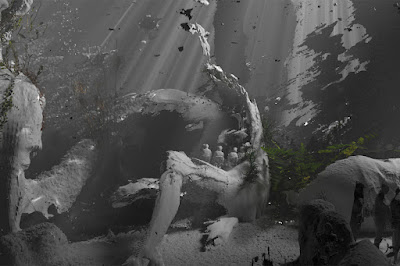Meriem Bennani - ROLE PLAY - Disorientalism
This post is a first walking around and approach to the Mediterranea topics in August 2022. I visited the Prada Foundation Observatory exhibition in Milan, curated by Melissa Harris.
I was attracted by the curatorial statement and the entire exhibition, where I found the videoart work of Meriem Bennani and Narcissisters essential to understand how the complexity of identity and gender statement can be represented in awry humour and playing with stereotypes.
Exhibition visited in August 2022, ROLE PLAY, Prada Foundation - Observatory.
“Role Play” is an exhibition curated by Melissa Harris that explores the notions of the search, projection and invention of possible alternative identities, hovering between authentic, idealized, and universal selves through a selection of photographic, video and performing works by 11 international image-based artists.
Playing with gender tropes, stereotypes, sense of place, and future perspectives, the artists who make up “Role Play” interrogate individuality as we know it and as it might be. Role-playing, creating alter-egos, and proliferation of selves are possible strategies for understanding each individual’s essence and persona.
“Role Play” features works by artists Meriem Bennani, Juno Calypso, Cao Fei, Mary Reid Kelley and Patrick Kelley, Beatrice Marchi, Darius Mikšys, Narcissister, Haruka Sakaguchi & Griselda San Martin, Tomoko Sawada, Bogosi Sekhukhuni, and Amalia Ulman in a light installation project, conceived by the creative agency Random Studio for the two exhibition floors of Osservatorio.
FOCUS on MERIEM BENNANI
Extract from: https://curamagazine.com/digital/meriem-bennani-3/
Extract from: https://curamagazine.com/digital/meriem-bennani-3/
Meriem Bennani has been developing a shape-shifting practice of films, installations and immersive environments, interlacing references to globalized popular culture (music, reality TV, fashion) with the vernacular and traditional representation of her native Moroccan culture and visual aesthetics that she captures with her iPhone. Composed of awry humour and a subtle agility to misappropriate the clichés of Middle-Eastern culture, her work questions our contemporary society and its fractured identities, gender issues and ubiquitous dominance of digital technologies.
Familial and female spheres lay at the center of Meriem Bennani’s practice and as a strong element of her visual language since the female characters of her family are featured in most of her video pieces.
Meriem Bennani’s approach bears a deep and sensitive understanding of identity issues, while distancing herself from any stereotypical discourse on immigration or the Arab world. On the contrary, she operates a certain form of disorientalism, or a deconstruction of the orientalist clichés that might very likely be expected from her practice as an Arab female artist.
Suppose Meriem Bennani appears as one of the most fascinating artists from her generation. In that case, it is precisely because of her ability to deconstruct the dichotomies between what we expect from the East and the West, from the public and the domestic, and to disclose the complexities of cultural productions, artistic disciplines and plural identities. In a globalized world increasingly preoccupied with identity politics, and in an art community often divided by them, there is, in Bennani’s extensive and generous approach, the endless hope or perhaps the insane utopia that what we have in common can defeat what divides us.







